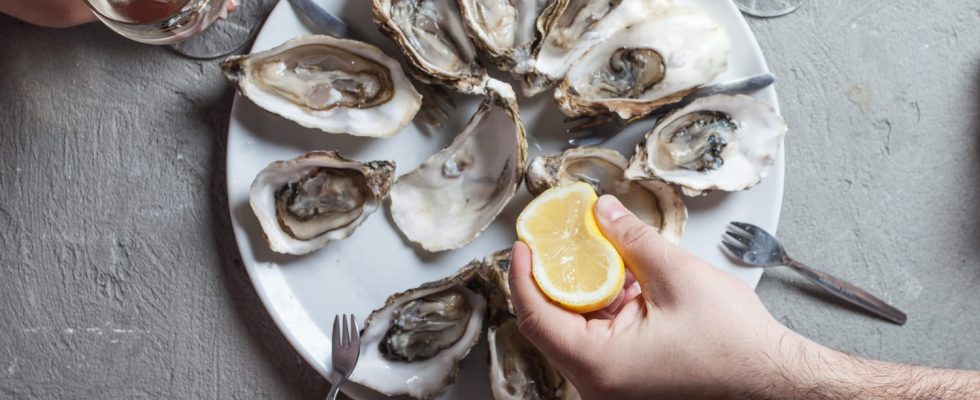Norovirus is a very contagious virus responsible for symptoms of gastroenteritis (diarrhea, vomiting, etc.) which can contaminate oysters.
Every year, at the time of holidaysof the Oysters are contaminated by norovirus and so unfit for consumption (otherwise at the risk of being sick). What is norovirus? What are the symptoms in case of poisoning? What to do ? What are the risks of complications? How long are we contagious?
What is norovirus?
Norovirus is a virus that belongs to the Caliciviridae family. These viruses were previously known as Norwalk, Norwalk-like, or Calicivirus viruses. According to a document from ANSESthese viruses – very resistant – constitute the main causes of acute gastroenteritis (inflammation of the stomach and intestine) in humans of all age groups. It is also thethe infectious agent most frequently responsible for epidemics of gastroenteritis which occur in communities (nurseries, hospitals, schools, retirement homes, cruise ships…). The majority of foodborne norovirus outbreaks are linked to the consumption of contaminated shellfish during accidental spills of wastewater or network distribution water following network malfunctions. Noroviruses can only reproduce if they infect a human.
What are the symptoms of norovirus poisoning?
Norovirus infection can cause symptoms of acute gastroenteritis as :
- The sudden onset of vomiting and nausea
- Diarrhea
- Abdominal cramps
- A moderate fever (low reported in less than 50% cases)
- Sometimes headaches
- Sometimes aches
- Sometimes chills
The illness is rather brief in healthy people. These symptoms last on average 2-3 days (sometimes more, up to 6 days, in children and the elderly). It is right to consult your doctor promptly if you have these symptoms, mentioning the consumption of these oysters. Immunocompromised people (elderly people or people with chronic pathologies, or very young children) must be particularly attentive to these symptoms, which may suggest infection by norovirus. The diagnosis is based on clinical suspicion in a patient with typical symptoms, especially during an epidemic and on PCR tests on a stool sample.
Asymptomatic people can also shed the virus.
What are the risks of complications?
In immunocompromised people or young children, norovirus poisoning can lead to complications such as:
- A dehydration with a (significant) weight loss.
- A electrolyte disturbance (hypokalemia).
- A renal failure which could lead to death.
Is norovirus contagious?
Yes, norovirus is a virus very contagious. The peak of excretion of the virus in the stools varies 3 to 10 days depending on the individual. Indeed, “excretion in the stools can be high (up to 1011 particles/g of stool) and prolonged over time (two to three weeks after symptoms disappear). Asymptomatic people (1/3 of poisoned people are asymptomatic) can also shed the virus in significant quantities. Very high quantities of viral particles are therefore present in releases during winter epidemics“, reports ANSES.
What is the incubation time for norovirus?
Norovirus infection can cause symptoms of gastroenteritis, the incubation period of which can range from 10 to 50 hours (up to approximately 2 days)according to ANSES.
Transmission by fecal-oral route (from stools to mouth) is the most important. A person can become infected in several ways:
► By having direct contact with a sick person (caring for a sick person, sharing food, drinks or utensils with a sick person)
► By touching contaminated surfaces or objects by norovirus and then putting your fingers in your mouth (contaminated surfaces, handles or faucets in the washroom)
► By eating food or drinking liquids contaminated with norovirus (a sick food handler who contaminates food or drinks);
Treatment: what to do in case of norovirus poisoning?
Antibiotics are ineffective.
No antiviral treatment There is currently no vaccine to treat norovirus infections to prevent infection. Antibiotics are ineffective. According to the PACA Regional Health Agency, the only treatment consists of the prescription of supportive care such as oral rehydration (water with a little salt and sugar, oral rehydration solution found in pharmaciesjuice, clear or more consistent soup depending on tolerance), sometimes antiemetics and oral or isotonic IV fluids (electrolyte powder to quickly rehydrate the body). Of the antidiarrheals (loperamide for example) can be given to adults but not to children under 18 years of age who have acute diarrhea and to any patient who has recently taken antibiotics, has bloody diarrhea, or has diarrhea with fever.
What prevention to avoid norovirus poisoning?
Noroviruses are resistant to conventional food preservation methods (refrigeration and freezing) as well as temperature (30 min at 60°C) and pH variations. Commonly recommended precautions to prevent bacterial growth have no effect on viral contamination. Nevertheless, hygiene rules must be respected in the event of a sick person in the household:
► Insist on careful hand washing when leaving the toilet, before preparing and eating meals.
► Wash fruits and vegetables carefully
► Thoroughly clean and then disinfect soiled surfaces immediately after an episode of illness (vomited matter, diarrheal stools) using bleach
► Immediately remove and clean, in hot water with detergent, clothing, sheets or other fabrics that may have been contaminated after an episode of illness
► Dispose of vomited matter or diarrheal stools in the toilet and ensure that the surrounding area is always clean.
► People infected with norovirus should not handle food.
► Avoid consuming shellfish if they do not come from an authorized and controlled farming area, or after prolonged cooking.
Sources: Site Reminder Conso.gouv / ANSES fact sheet: norovirus / Questions and answers on noroviruses (viral gastroenteritis) for patients and health professionals, ARS PACA
